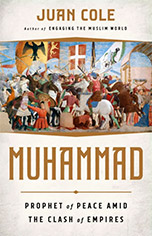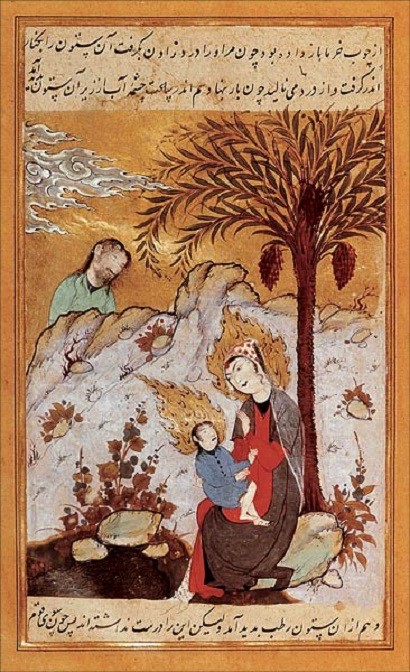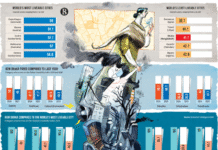https://www.juancole.com/
By Juan Cole | (Informed Comment) |
Revised.
The Qur’an, the scripture Muslims believe was received by the the Prophet Muhammad (d. 632) by divine inspiration, has a number of passages that mention Mary and the virgin birth of Jesus.
The Chapter of Mary, 19:16, says (my interpretation):
And mention in the Book Mary, when she withdrew from her family to an eastern place.
It is implied that it was her unexplained pregnancy that caused her to withdraw.
Verses 19:17-35 continue:
And once remote from them, she hid behind a screen. Then we sent to her our spirit, who took the shape of a well-formed man.
She said, “I take refuge in the All-Merciful from you, if you are pious.”
He said, “I am but an angel of your lord, come to bestow on you a son without blemish.”
She said, “Will I have a son, when no mortal has touched me, and I was not rebellious?”
He said, “So it is.” He said, “Your Lord says, it is easy for me. We will make him a sign for the people and a mercy from us. The matter has already been decreed.”
So she bore him, and withdrew with him to a remote place.
And the pangs of childbirth drove her to the trunk of a palm tree. She said, “I wish I had died before now, and had been forgotten in oblivion.”
But he called to her from beneath her, saying, “Do not be sad. For your Lord has made a stream run beneath you.”
So shake the trunk of the palm tree toward you, and ripe, fresh dates will fall to you. So eat and drink and be comforted. If you see any human being, say, “I have taken a vow to the All-Merciful to fast, and will speak to no one today.”
Then she brought him to her people, carrying him, and they said, “Mary, you have done something unheard of!”
Sister of Aaron, your father was not wicked and your mother was not rebellious.”
She gestured to him. They said, “How can we speak to a baby in its cradle?”
He said, “I am the servant of God, and he gave me scripture and made me a prophet. He made me blessed wherever I might be, and counseled me to prayer and giving charity as long as I live. And he made me obedient to my mother, nor did he make me overbearing or cruel. Peace be upon me, the day I was born, and the day I die, and the day I am raised up alive.”
That is Jesus, the son of Mary, the Word of truth about whom they dispute. It was not for God to take a son. Praised may he be. When he decrees a thing, he says to it, “Be!” And it is.
This Christmas carol will seem both familiar and unfamiliar to Christians. The Qur’an tells a more elaborate story than does the New Testament. It underlines that Mary’s pregnancy was a scandal to the Jews of Jerusalem. The angel reassures her that a virgin can give birth, since God can make anything happen.
I talk about Christianity and Islam in my recent book,


Muhammad: Prophet of Peace amid the Clash of EmpiresNicola’s Books in Ann Arbor
And Hachette
And at Barnes and Noble
And Amazon
The Qur’an denies the fatherhood of God. Because it grew up in a polytheistic environment, there was always a danger that pagans would take the fatherhood of God and the sonship of Jesus literally. The Qur’an rejects this metaphor, almost uniquely among religious texts of that era.
Jesus is a sign that God can say “Be!” and, it is. He is also the Word of the Truth.
As for Mary, some Muslim scholars considered her a prophet in her own right, and Jesus is depicted as demanding respect for her.
This is one of the passages that convinced the authors at the Vatican in the 1960s, who produced the Vatican II document, that Islam has some of the divine truth.
A passage of November 1964 says
“But the plan of salvation also includes those who acknowledge the Creator, in the first place among whom are the Muslims: these profess to hold the faith of Abraham, and together with us they adore the one, merciful God, mankind’s judge on the last day.”
A passage the month before had said,
““The Church has also a high regard for the Muslims. They worship God, who is one, living and subsistent, merciful and almighty, the Creator of heaven and earth (Cf. St. Gregory VII, Letter III, 21 to Anazir [Al-Nasir], King of Mauretania PL, 148.451A.), who has spoken to men. They strive to submit themselves without reserve to the hidden decrees of God, just as Abraham submitted himself to God’s plan, to whose faith Muslims eagerly link their own. Although not acknowledging him as God, they venerate Jesus as a prophet, his Virgin Mother they also honor, and even at times devoutly invoke. Further, they await the day of judgment and the reward of God following the resurrection of the dead. For this reason they highly esteem an upright life and worship God, especially by way of prayer, alms-deeds and fasting.”
“Over the centuries many quarrels and dissensions have arisen between Christians and Muslims. The sacred Council now pleads with all to forget the past, and urges that a sincere effort be made to achieve mutual understanding; for the benefit of all men, let them together preserve and promote peace, liberty, social justice and moral values.”
“Therefore, the Church reproves, as foreign to the mind of Christ, any discrimination against people or any harassment of them on the basis of their race, color, condition in life or religion. Accordingly, following the footsteps of the holy Apostles Peter and Paul, the sacred Council earnestly begs the Christian faithful to ‘conduct themselves well among the Gentiles’ (1P 2:12) and if possible, as far as depends on them, to be at peace with all men (cf. Rm 12:18), and in that way to be true sons of the Father who is in heaven (cf. Mt 5:45).”
The Vatican II council knew what it thought of Islamophobia or irrational hatred of Muslims. It called us all to something better, to an acknowledgement that Jesus and Mary unite people of faith, rather than dividing them and that discrimination against people on the basis of their religion or race is always wrong. The Qur’an also puts Jesus under the sign of peace.










